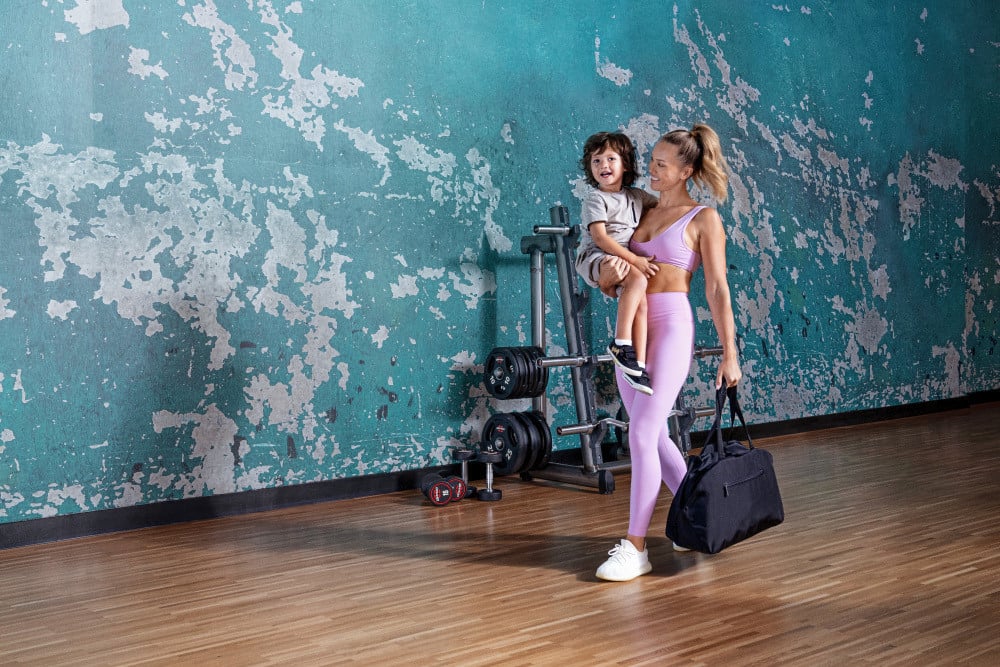How To Overcome Your Gym Anxiety
Summer is almost here—and while you’re ready to get fit, the thought of working out in public might give you anxiety and make your stomach churn. You might even find the comfort of the couch hard to leave when the gym seems overwhelming.
But your first workout doesn’t have to be nerve-wracking. With the right preparation and a solid plan, you can walk in with confidence and actually enjoy your gym experience. Here’s how to make the gym feel like a place you belong.
What Is Gym Anxiety?
Gym anxiety isn’t just about feeling nervous—it’s a specific fear of the gym environment that can hold you back from starting your fitness journey. It often stems from not knowing the gym etiquette, worrying about using equipment correctly, or fearing judgment from others. Many experience physical symptoms like a racing heart, tight throat, or muscle tension when they think about walking into a gym.
Signs You Might Have Gym Anxiety
Recognizing the signs can help you address your concerns head on:
- Physical Reactions: A racing heart, sweaty palms, or tension in your neck and shoulders.
- Avoidance: Choosing the couch over a workout, even when you’re motivated.
- Uncertainty: Feeling overwhelmed by unfamiliar equipment or the gym layout.
- Fear of Judgment: Worrying about being watched or criticized by others.
- Hesitation to Ask: Feeling too nervous to seek help or clarification on how to use a machine.

Step 1: Come to Terms with Your Feelings
Before you can overcome your anxiety, identify its roots. Spend a few minutes noticing the physical signals—like a tight throat or racing heart—and ask yourself what triggers these sensations. Is it the thought of using an unfamiliar machine? Or the idea of changing in a crowded locker room?
Once you pinpoint your specific triggers, you can take practical steps to manage them. For example, if the thought of a machine makes your heart race, practice deep breathing or rehearse a quick question for a trainer. Knowing exactly what makes you uneasy is the first step toward taking control.
Step 2: Get Your Mind Ready
A little mental prep can turn your anxiety into excitement. Here are three steps you can start at home about two weeks before your gym debut:
- Visualize Success: Imagine yourself confidently using the treadmill, finishing a spin class, or handling a kettlebell with ease.
- Set a Mini Goal: Pick one exercise to try at home—like five chair squats—and use it as a stepping stone for a similar gym exercise.
- Practice Simple Moves: Repeating basic routines like chair squats or wall push-ups builds muscle memory and reduces first-day jitters.
For a detailed, beginner-friendly workout plan, check out our Guide to Getting Gym Ready in 2 Weeks.

Step 3: Learn the Gym’s Ground Rules
Knowing what to do—and what not to do—can make your first gym visit a lot less stressful. While common sense goes a long way, these three principles will help you feel at ease from day one:
- Clean Up After Yourself: Always wipe down equipment after use. It’s a simple way to keep the space hygienic and show respect for fellow gym-goers.
- Claim Your Space: If you’re unsure whether a machine is available, simply ask instead of guessing. Most people are happy to share or let you know when they’re done.
- Ask for Help: Trainers aren’t just for personal sessions—they’re there to assist with equipment setup, form corrections, and any general questions. Don’t be afraid to approach them.
You’ll also hear phrases like “Can I work in with you?” or “Want a spotter?” These are part of gym lingo that creates a cooperative atmosphere. Learn what they mean, and dive deeper into good conduct in our guide, Gym Etiquette 101.
Step 4: Set Clear Goals
Before your first workout, set specific goals to keep anxiety in check, turn uncertainty into action, and build momentum.
- Define a Specific Goal: Ditch vague ambitions like “I want to get in shape.” Instead, set a concrete target: “I will walk on the treadmill for 15 minutes without stopping, three times a week.”
- Track Your Progress: Keep a workout log, jot down small wins, or take weekly progress photos. Even minor improvements—an extra rep, a longer walk—boost confidence.
- Celebrate Small Victories: Every completed workout is a win. Once you feel comfortable, push a little further—extend your treadmill time from 15 to 25 minutes, or try a new machine.
The key is to start simple and build gradually. Need more tips on easing first-time jitters and making workouts enjoyable? Check out our guide to starting your fitness journey.

Step 5: Get to Know Your Intended Gym
A little research before your first visit can help ease your nerves. Here’s what to look for:
- A Welcoming Atmosphere: Look for a gym where the staff greet you warmly. At Gold’s Gym SoCal, new members are personally welcomed by trainers who offer a brief tour, making you feel at home right away.
- Convenience: Choose a gym that fits your daily routine, as its location plays a huge role in helping you build a habit. With over 16 Gold’s Gym SoCal locations, you can find one that’s near your work, home, or favorite hangout.
- A Supportive Community: Opt for a gym that caters to all fitness levels. At Gold’s Gym SoCal, you’ll join a diverse community where everyone—from beginners to seasoned pros—supports each other.
Take Your First Step to Fitness
Overcoming gym anxiety isn’t about perfection on day one—it’s about showing up and taking that first step. With clear planning, some at-home practice, and a welcoming gym environment, your first visit can feel less intimidating and more empowering. Your future self will thank you.
Ready to get started? Try Gold’s Gym SoCal FREE for 7 days and experience workouts designed for progress, not pressure.

FAQs
How long does it take to get over gym anxiety?
For many, noticeable improvement comes within 2–4 weeks of regular gym visits. Consistency is key—by setting small, achievable goals and gradually building your routine, you'll start feeling more at ease as the environment becomes familiar.
Is it normal to feel nervous at the gym?
Yes, it's completely normal. Nearly everyone experiences some nervousness when starting out, whether it's worrying about using equipment or feeling self-conscious around seasoned gym-goers. Over time, as you become more comfortable with the gym's routines and culture, those nerves typically fade.
How do I start going to the gym alone?
Start by planning your workout in advance. Choose a time when the gym is less crowded, consider taking a quick tour, and try scheduling a free introductory session if available. Preparing a simple routine—like a mix of cardio and basic strength exercises—can help you focus on your goals rather than on the unfamiliar surroundings.
What should I do if I feel overwhelmed at the gym?
If you feel overwhelmed, step back for a moment. Practice deep breathing, take a short break, or head to a quieter area of the gym. Don't hesitate to ask a trainer for assistance or clarification on equipment usage. Remember, it's okay to ease into your routine gradually and build your confidence over time.
How can I maintain my confidence once I start going to the gym?
Maintain your momentum by setting specific, measurable goals—such as increasing your treadmill time or adding a new exercise to your routine. Track your progress using a workout log or photos, and celebrate every small win. Joining group classes or finding a workout buddy can also reinforce a positive, supportive atmosphere that keeps you motivated.



